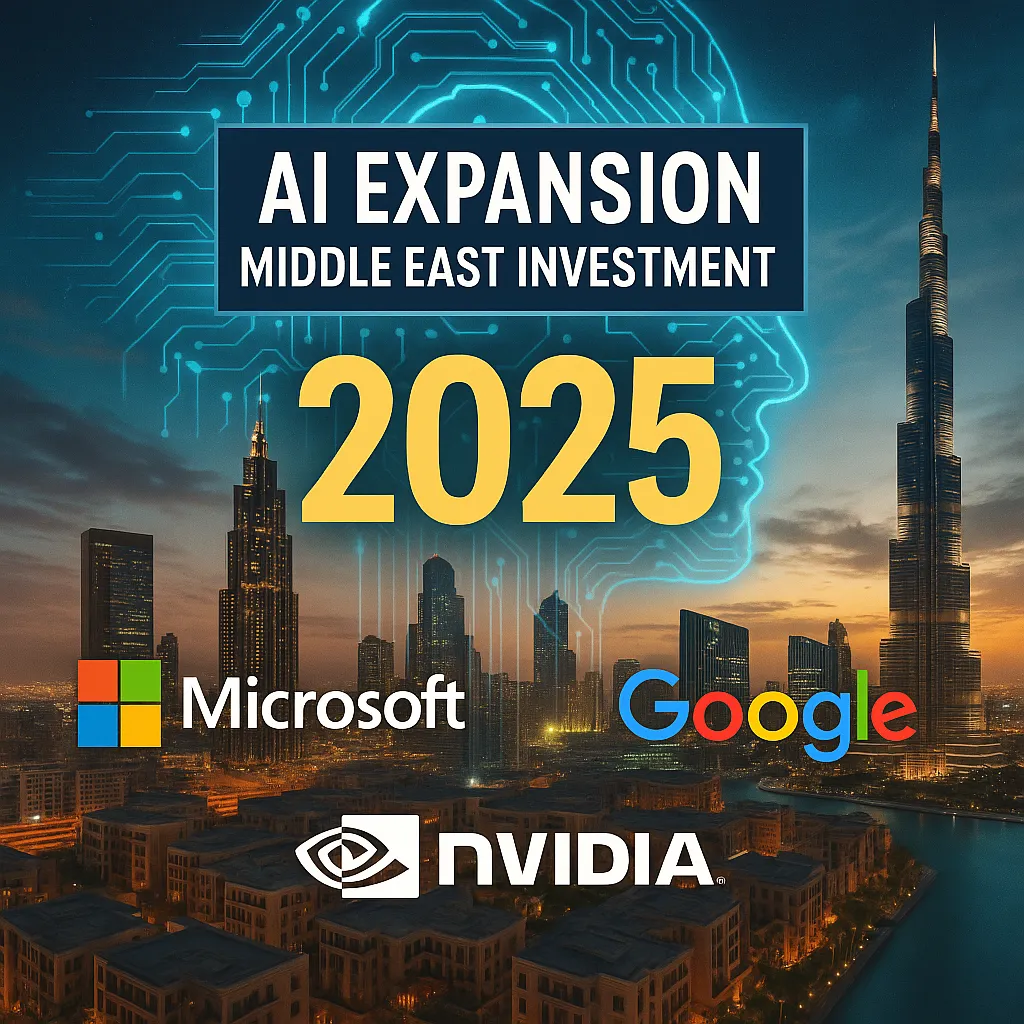
AI Expansion in the Middle East: 3 Tech Giants Racing for 2025 Growth
The AI expansion Middle East investment 2025 is accelerating faster than analysts predicted. Tech giants are racing to secure partnerships, data centers, and government-backed projects across the region. This push highlights how the Middle East is positioning itself as a global hub for artificial intelligence funding trends.
Microsoft, Google, and Nvidia lead the pack. Their capital commitments focus on cloud infrastructure, AI-powered services, and education initiatives. For global investors, this trend marks the next frontier in tech investment in emerging markets.
The outcome goes far beyond regional growth. It ties directly into global AI infrastructure growth, shaping how data and innovation will flow worldwide. As governments align with corporate giants, opportunities open across equities, crypto, and commodities. Investors tracking day trading momentum and diversified portfolios can’t ignore this movement.
🤖 Key Points
- AI expansion Middle East investment 2025 is fueled by global tech leaders.
- Microsoft, Google, and Nvidia commit billions to infrastructure and training.
- Regional governments push artificial intelligence funding trends through policy support.
- Opportunities for investors link directly to early growth stocks.
- External insights from Reuters and WEF provide global context.
Competitor Review: Microsoft, Google, and Nvidia in the Middle East
The AI expansion Middle East investment 2025 is defined by three global tech leaders. Microsoft, Google, and Nvidia are racing to secure influence in the region. Each has committed billions to infrastructure, partnerships, and research.
Microsoft leads with cloud and enterprise tools. Google focuses on AI education and language models for Arabic markets. Nvidia delivers the chips and computing power that drive innovation.
According to Reuters, Microsoft is building new data centers across Saudi Arabia and the UAE. Google has announced partnerships with local universities to expand AI training. Nvidia has entered supply agreements with regional governments to accelerate computing capacity.
Microsoft’s stock reflects global cloud demand. Its Middle East push may strengthen earnings tied to AI services. For investors, this connects directly to growth opportunities in early-stage equities.
Google and Nvidia provide unique advantages. Google’s regional presence supports artificial intelligence funding trends. Nvidia’s GPUs remain the backbone of global AI infrastructure growth. Together, these players reshape the future of tech investment in emerging markets.
Why the Middle East Became a New AI Battleground
The AI expansion Middle East investment 2025 is not happening by accident. Governments across the region have committed billions in funding, and this has created one of the most attractive destinations for artificial intelligence funding trends. By lowering barriers for foreign investment and offering incentives for technology firms, the Middle East is positioning itself as a global AI hub.
Saudi Arabia’s Vision 2030 program highlights artificial intelligence as a key pillar of future economic growth, and the UAE has gone even further by establishing a Ministry of Artificial Intelligence to drive policy and adoption. These moves demonstrate that the region is not simply following global trends but actively shaping them, while creating fertile ground for corporate giants to expand their footprints.
Microsoft, Google, and Nvidia recognize the advantage of striking early partnerships in regions where infrastructure is expanding quickly. Unlike mature markets where competition is already entrenched, the Middle East offers first-mover benefits for firms that can build trust with governments and universities. The result is a rapid acceleration of global AI infrastructure growth that ties emerging markets to the most advanced computing systems in the world.

For investors, the signal is clear: the region’s focus on AI is not just about adopting technology but also about creating a sustainable ecosystem that attracts continuous investment. This dynamic opens diversification strategies that connect real estate, equities, and even commodities to the long-term AI buildout.
As emerging markets embrace cutting-edge AI, they strengthen their role in global finance, and investors who recognize these signals early may benefit from the compounding effects of tech investment in emerging markets.
Global AI Infrastructure Growth and Market Signals
The AI expansion Middle East investment 2025 is not only about regional opportunities, it is also about building a new layer of global AI infrastructure growth that will impact every sector of the economy. When Microsoft, Google, and Nvidia pour billions into emerging markets, they create ripple effects that extend to semiconductors, cloud services, and cross-border data flows.
This expansion demonstrates how capital allocation in one region can accelerate global adoption of artificial intelligence. Analysts suggest that the Middle East could become a hub for advanced training models, which would reduce reliance on Western or Asian data centers and open new trade routes for technology services. For investors, these developments are early indicators of shifts in global capital markets.
Nvidia’s market dominance in GPUs is directly tied to the success of AI projects in the Middle East. Every new data center, university lab, and government initiative requires high-performance computing, and Nvidia remains the supplier of choice. This reinforces the link between artificial intelligence funding trends and the value of publicly traded equities.
🌍 Reports from Reuters confirm that Middle Eastern governments are signing long-term contracts with U.S. tech firms. At the same time, the World Economic Forum highlights how AI adoption is reshaping workforce strategies across emerging markets.
For global investors, these signals matter because they highlight how tech investment in emerging markets is directly tied to global equity performance. The companies that dominate AI today will also influence supply chains, job creation, and long-term wealth patterns tomorrow. Investors who recognize these links early will have the advantage of aligning with markets before broader adoption takes place.
Investment Strategies: Tech Expansion and Emerging Market Growth
The AI expansion Middle East investment 2025 is more than a regional development. It is an investment signal that shows how global capital flows are being redirected into new markets. Investors who understand this shift can use it to identify where the next wave of wealth creation will occur.
Traditional strategies often focused on developed markets such as the United States, Europe, or Asia, but the Middle East is now entering the spotlight. Its ability to attract corporate giants like Microsoft, Google, and Nvidia highlights the scale of opportunity available. With billions allocated toward cloud infrastructure, advanced chips, and AI education, the region is laying the foundation for long-term growth.
This dynamic aligns directly with artificial intelligence funding trends, where governments provide matching incentives to encourage private sector involvement. As a result, the Middle East is not only a participant but also a leader in shaping the future of global AI infrastructure growth. This means that investors should think beyond local real estate or energy plays and look toward technology-led diversification.

For global investors, this provides multiple pathways. Equity investors may focus on leading U.S. tech companies whose revenues will expand with international contracts. Venture capitalists may look toward Middle Eastern startups that benefit from partnerships with these larger firms. Meanwhile, traders may monitor day trading opportunities in stocks that react quickly to AI announcements and contract news.
The region’s growth also connects with broader diversification strategies. For example, investors who already follow crypto and metals portfolios can use AI as a hedge against volatility in traditional assets. Just as silver and critical metals hedge inflation risks, AI-related equities and ETFs may hedge against stagnation in slower-growth industries.
At its core, the tech investment in emerging markets story is about more than profits. It is about influence, infrastructure, and long-term capital allocation. Investors who recognize how the Middle East is integrating into the global AI ecosystem will be better prepared to adapt portfolios to reflect this once-in-a-generation shift.
Additional Insights and Resources
Breaking news and analysis on AI projects and corporate partnerships in the Middle East.
World Economic ForumInsights on global AI adoption, funding trends, and the future of technology policy.
📌 Related Posts
FAQs on AI Expansion Middle East Investment 2025
❓ Why are Microsoft, Google, and Nvidia focusing on the Middle East in 2025?
The AI expansion Middle East investment 2025 is being fueled by both corporate ambition and national strategies. Countries like Saudi Arabia and the UAE are investing heavily in artificial intelligence to diversify their economies. Microsoft, Google, and Nvidia are responding by securing early partnerships, building data centers, and funding education initiatives. This alignment between public funding and private expansion mirrors broader artificial intelligence funding trends seen worldwide.
❓ How can global investors benefit from this AI expansion?
Investors can gain exposure by following tech investment in emerging markets where growth potential remains untapped. U.S. equities tied to cloud services, semiconductors, and AI solutions stand to benefit as contracts flow into the Middle East. The trend also creates new opportunities for diversification through ETFs and even early-stage equities. As global AI infrastructure growth accelerates, portfolios aligned with these developments can capture both stability and innovation-driven upside.
❓ Which industries will feel the biggest impact?
While technology is at the center, multiple industries will feel the effects of the AI buildout. Construction firms benefit from building new data centers. Energy companies supply the massive power required for GPU-driven computing. Education providers integrate AI training into curriculums. Financial markets adopt AI for trading, compliance, and lending. This interconnectedness means the AI expansion Middle East investment 2025 is not just a tech story, but an economy-wide transformation.
❓ Is this momentum sustainable long term?
The growth is designed to be sustainable. National programs like Saudi Arabia’s Vision 2030 and the UAE’s Ministry of Artificial Intelligence ensure continued momentum. Ongoing artificial intelligence funding trends provide resources not only for infrastructure, but also for talent development and regulatory frameworks. This long-term planning reduces the risk of a short-lived boom and increases the likelihood of consistent capital flows into the region.
Conclusion: Preparing Portfolios for the AI Era
The AI expansion Middle East investment 2025 demonstrates how quickly global capital can shift into new regions. As Microsoft, Google, and Nvidia anchor their strategies in the Middle East, they create a blueprint for how artificial intelligence will spread worldwide.
For investors, the message is clear: global AI infrastructure growth is not confined to Silicon Valley anymore. It is expanding into emerging markets, where incentives and partnerships accelerate adoption. Recognizing these signals early gives investors the chance to position portfolios for both resilience and growth.
By combining exposure to leading tech equities with emerging-market strategies, crypto, and metals, investors can build a balanced approach. This balance helps protect against risk while capturing the upside of tech investment in emerging markets. The next decade of wealth creation will be tied closely to where AI infrastructure expands, and right now, the Middle East is at the center of that story.
🚀 Position Your Portfolio for AI Growth
Stay ahead of global investing shifts with TradeStockAlerts.com. Get real-time alerts, market analysis, and strategies for stocks, crypto, metals, and AI-driven opportunities.
Join Now
Pauline Lei
Lead market analyst at TradeStockAlerts.com. Pauline tracks global technology and investing shifts, from AI expansion in the Middle East to U.S. market strategies. She helps traders connect regional growth stories to long-term opportunities in stocks, crypto, and metals, showing how emerging-market investments today can shape tomorrow’s global portfolios.